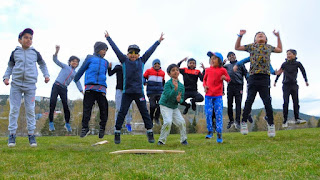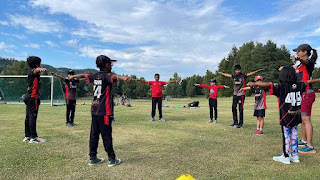From Kids to Players to Cricketers
2020 will remain a landmark year for
people who lived through the first global pandemic in the 21st century. For me
it will remain a year when I started with cricket coaching. That year in
September when the first wave of Covid-19 was dying down, Bijeyata, my partner
in crime, was asked by our cricket club, Vestli CK, to join hands for coaching
the U13 boys’ team. She was looking for weekend jobs then and was happy to
oblige. I started hanging out with her at the sessions and contributed when
required. Speaking for both of us, it was a dive down the deeper end as we came
with zero experience of cricket/sports coaching. However, both of us had our
share of ‘teaching’ experience coming from homes with teaching as a staple
profession. As fate would have planned it within a short time, the main coach
of the U13 team had to leave and that is when Bijeyata and I had to take full
control of the squad. While there was a decent six months of gap between us
starting and taking over the complete duties, it felt much shorter as the
training sessions were disrupted several times due to the pandemic.
We started working regularly with a group of around 25 boys within the age group of 5 to 11 years in May 2021. Many of them have never played cricket before. The league started on June 5th. We divided the boys in two teams and both participated in the U13 league with a total of seven teams, as A and B. Our oldest players were 11 years old and the average age of the group was less than 9. The A team consisted of ‘kids’ whom we considered ‘ready’ to play some cricket whereas the B team was otherwise. We inherited the keyword ‘ready’ from our former coach. We learnt on the job that our 9–10-year-olds did not have the cricketing skills as well as the physical strength to compete against other teams. Agility was however the strength our ‘ready’ boys.
We decided to put our full focus on fielding and only the left-over time was used for batting or bowing during practice hours. While we the plan was not full proof, at the end of the season, we realized our strategy had worked. Our ‘ready A’ team topped the table with 10 wins out of 12 games wherein one game was washed out. Our B team put a decent show but lost all their games barring one and were at the bottom of the table but their development over the 12 games was definitely noteworthy, and that was a development which cannot be described by the numbers on the scorecard. The ‘kids’ in both the teams were on the verge of becoming players of a team-sport, having learnt the core values of team spirit. Nevertheless, some numbers are worth mentioning for the A team as those assure that our plans as coaches had worked. Out of the 44 wickets our bowlers picked, 31 were caught and in addition we got 12 run-outs. We bowled all our 120 overs and gave away only 528 runs. The next best team gave 702 runs in the 118.3 overs they bowled. The difference in the fielding (that assisted the bowling) effort was clear. Another set of numbers that support the worth of ‘fielding’ strategy is that our two teams, A and B, flanking the point table at top and bottom scored almost the same number of runs however at varying rates, 688 (7.7 per over) and 686 (5.8 per over) respectively. So, it was indeed the fielding effort that made the two sides so different in terms of the outcome. For A team, the bar was set high on its own as they won the first ever league, they played. For B team we had to highlight their efforts, their learning curve and every single take away in terms of skills and attitude to keep the motivation up.
During the
season both me and Bijeyata had
taken ECB level two coaching course and that equipped us with cricket coaching
skills and allowed us to better formulate our coaching philosophy. When we
returned to (long Norwegian) winter training, we decided to keep our focus on
fielding and get started with bowling line and length, still holding batting
behind these two in the learning goals queue. It was tempting to get on to
bating as well as very hard to keep the boys focused on fielding and bowling.
But we had decided to trust the process. By the time we had gotten ready for
season 2022, our ‘players’ had acquired the skills to bowl a certain line (and
a bit of length) with the numbers of wides reducing significantly and
outside-pitch no balls had nearly disappeared. We entered a 10 team U13 league
with these skills, again with two teams which were both ‘ready’ this time. True
to the time and effort we spent in the training sessions, both teams performed
well. A team was runners up, falling behind just by one point with two rain
washed games and B team was 4th on the point table. The strength of
A team remained not letting other teams score over them. Up until now our boys
were scoring a max of 10-20 individual runs with a rare 30 or 40 once in the whole season.
At the end of
2022, we went through a
transition, with some of our older players getting over 13 years and some
leaving due to change in location etc. During the winter training we were not
sure if we will be able to field two teams in 2023. We did welcome new ‘kids’
when they came to training but it was not easy for them as this was the time
our ‘players’ were transforming into cricketers and it was too steep a curve
for new ‘kids’ to roll up. We offcourse could have started with training at
two levels but that was not possible with the limited indoor space we had
access to. Nevertheless, we did find the resilient ones, who climbed up the
ladders rather quickly and found a niche for themselves as ‘players’ among the
‘cricketers’. This winter was all about a comprehensive training program, that
included strength and conditioning, cricket theory, strategic learning and the
much-awaited batting shots. We started off with basics of drive, pull, cut and
hook (for the still younger ones) and ended with flick, ramp, sweep and ‘SKY’
shots in the making. Strength and conditioning programs improved the stamina
reasonably and the boys were full of energy even at the end of a 2-hour
session. We included 15 min one-to-one sessions for 3 players at a time with
each one getting 5 minutes of our dedicated time. These 5 minutes sessions were
unimaginably instrumental in increasing their self-confidence and the intent to
learn. At this point we had stopped coaching and were just facilitating their
quest to explore cricket, its art, its science and its philosophy. It was the
theory and the strategic sessions that helped with the full transformation from
‘players’ to ‘cricketers’.
The league
structure changed in
2023 and our two teams were placed in two different groups of U13 league. Each
team was supposed to play 10 games against 5 different opponents. We went into
the series much better prepared than the previous years and more importantly
both the teams were quite independent in terms of managing the game on their
own inside the ground. The batting training has shown its results as we have
two half-centuries so far, this season as well as a number of 20s, 30s and 40s.
While the one umpire policy for U13 games is not ideal, it has given us an
opportunity to stand as leg umpire many a times and experience our little
cricketers from inside the ground. Without being modest, the feeling is
overwhelming when we hear the captain asking a player to go to fine leg but
then the bowler asks the keeper to move the fielder to 3rd man and
the captain obliges. It is a hugely satisfying feeling when the captain asks a
fielder to move ‘squarer’, when the keeper asks the bowler to bowl on ‘6th
stump’, when the captain stays with a 5-2 field on the offside despite the
batter hitting sixes at the mid-wicket areas as the team has a plan. These
plans are sometimes right, sometimes wrong but these are their plans, plans of
the ‘kids’ who have grown into ‘cricketers’ in front of our eyes. Both the
teams are practically one win away from topping their point-tables. But it
would not matter as we can proudly say that win or loose these kids will remain
as cricketers for the time to come.








Comments
Post a Comment